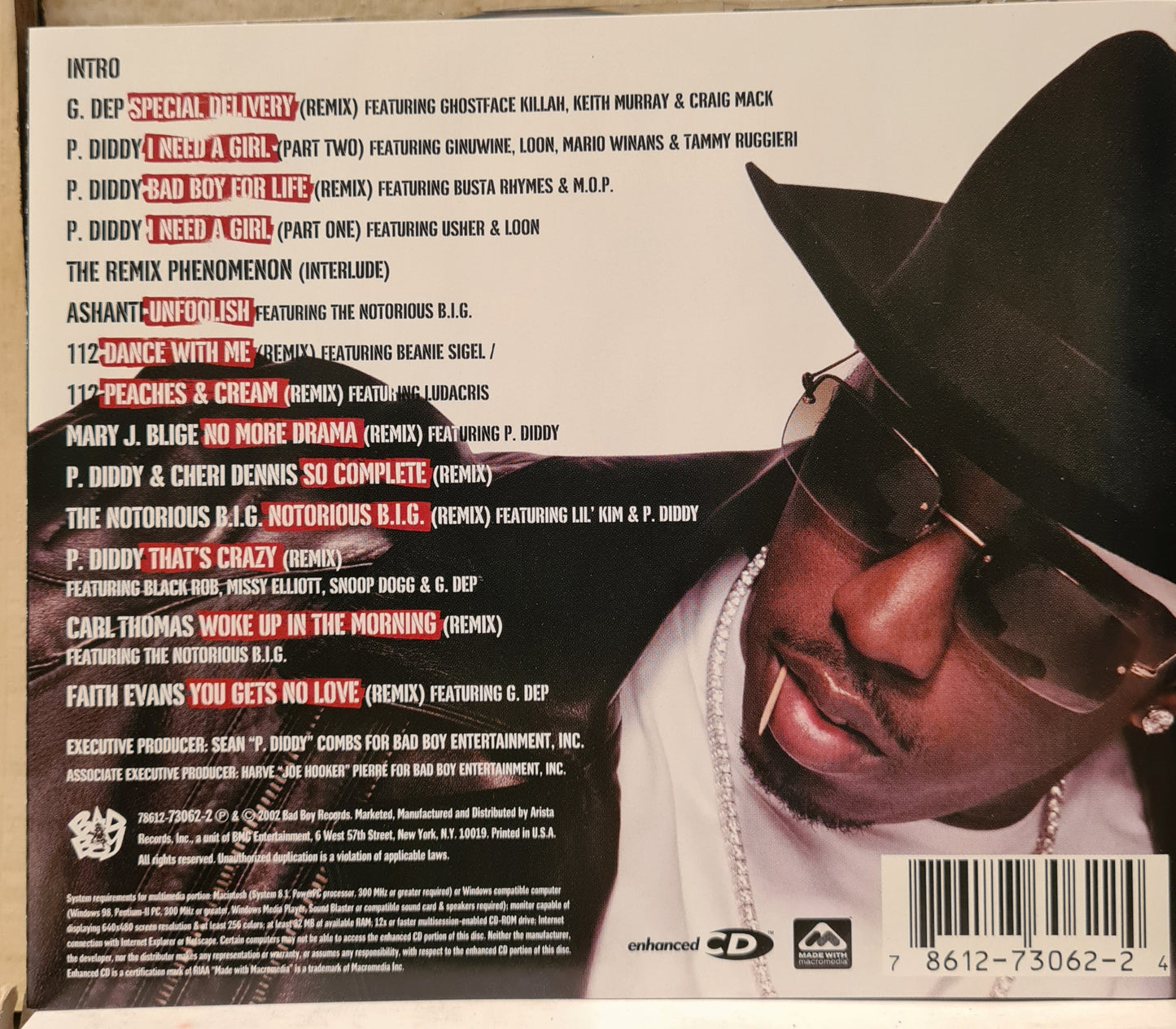Table of Contents
Introduction
In the world of hip-hop, few names resonate as powerfully as P Diddy and his iconic label, Bad Boy Records. Founded in 1993, Bad Boy Records not only revolutionized the music industry but also became a cultural phenomenon that transcended music. From its gritty New York roots to global dominance, Bad Boy Records carved a legacy that continues to influence artists today. P Diddy's vision and leadership turned the label into a powerhouse, producing some of the most memorable tracks and artists in hip-hop history.
Bad Boy Records wasn't just about music; it was about creating a movement. The label's ability to blend gritty street narratives with polished production set it apart from its contemporaries. With hits like "Juicy" by The Notorious B.I.G. and "No Way Out" by P Diddy himself, the label became synonymous with success, ambition, and innovation. Its impact on the hip-hop genre and pop culture as a whole is undeniable.
This article delves deep into the rise, influence, and legacy of Bad Boy Records, exploring how it became a cornerstone of hip-hop culture. We'll examine the key figures, groundbreaking strategies, and cultural contributions that defined the label. By the end of this piece, you'll have a comprehensive understanding of why Bad Boy Records remains a pivotal chapter in the history of music.
Read also:Captain Lee The Legendary Leader Of Below Deck
The Rise of Bad Boy Records
Bad Boy Records was founded by Sean "Puffy" Combs, later known as P Diddy, in 1993. After being fired from Uptown Records, Combs channeled his frustration into creating a label that would redefine the music industry. Armed with a keen ear for talent and an unrelenting work ethic, he set out to build an empire that would rival the biggest names in the business.
The label's early years were marked by a mix of struggle and triumph. Combs signed The Notorious B.I.G., a relatively unknown rapper at the time, and helped craft his debut album, "Ready to Die." The album's success catapulted both Biggie and Bad Boy Records into the spotlight. Tracks like "Juicy" and "Big Poppa" became anthems, solidifying Bad Boy's place in hip-hop history.
What set Bad Boy apart was its ability to blend raw, authentic storytelling with polished, radio-friendly production. This unique combination resonated with audiences and helped the label grow rapidly. By the mid-1990s, Bad Boy Records had become a dominant force in the music industry, signing artists like Faith Evans, Mase, and 112, and expanding its influence beyond hip-hop into R&B and pop.
P Diddy: The Visionary Behind the Label
At the heart of Bad Boy Records' success was Sean "P Diddy" Combs, a man whose ambition and creativity knew no bounds. Combs wasn't just a music executive; he was a cultural icon who understood the power of branding and storytelling. His vision for Bad Boy was clear: to create a label that not only produced hit records but also shaped the culture.
Combs' leadership style was hands-on and innovative. He was deeply involved in every aspect of the label, from artist development to marketing strategies. His ability to spot talent was unparalleled, as evidenced by his discovery of The Notorious B.I.G. and his decision to sign artists who would later become household names. Combs also pioneered the use of music videos as a marketing tool, ensuring that Bad Boy's visual storytelling matched the quality of its music.
One of P Diddy's most significant contributions was his emphasis on the "Bad Boy" lifestyle. This concept, which combined luxury, ambition, and authenticity, became a blueprint for success in the music industry. It inspired a generation of artists and entrepreneurs to dream big and pursue excellence. Combs' influence extended beyond music, as he ventured into fashion, television, and philanthropy, further cementing his status as a cultural icon.
Read also:Who Is Paige Young Sheldon Unveiling The Life And Achievements Of A Rising Star
Key Artists and Their Impact
Bad Boy Records was home to some of the most influential artists in hip-hop history. These artists not only shaped the label's identity but also left an indelible mark on the genre. Below is a breakdown of key figures and their contributions:
The Notorious B.I.G.
Christopher Wallace, better known as The Notorious B.I.G., was the crown jewel of Bad Boy Records. His debut album, "Ready to Die," is widely regarded as one of the greatest hip-hop albums of all time. Biggie's storytelling prowess and smooth delivery set a new standard for lyricism in the genre.
P Diddy
As both the founder and a recording artist, P Diddy played a dual role in Bad Boy's success. His debut album, "No Way Out," featured hits like "Can't Nobody Hold Me Down" and "I'll Be Missing You," which became global sensations.
Faith Evans
Faith Evans brought a soulful touch to Bad Boy's roster. Her collaborations with The Notorious B.I.G., including the posthumous hit "I'll Be Missing You," showcased her vocal talent and emotional depth.
Mase
Mase, known for his smooth flow and charismatic presence, became a breakout star with hits like "Feel So Good." His success helped Bad Boy expand its reach into mainstream pop.
112
This R&B group added a romantic dimension to Bad Boy's catalog, with hits like "Only You" and "Peaches & Cream." Their success demonstrated the label's versatility and ability to cross genres.
These artists, among others, helped Bad Boy Records build a diverse and impactful catalog that continues to influence music today.
The Business of Bad Boy: Marketing and Innovation
Bad Boy Records wasn't just a music label; it was a masterclass in branding and innovation. P Diddy's approach to marketing was revolutionary, leveraging music videos, fashion, and media to create a cohesive brand identity. The label's "shiny suit" era, characterized by luxurious aesthetics and aspirational imagery, became iconic in the 1990s.
One of Bad Boy's most significant innovations was its use of music videos. P Diddy understood the power of visuals in storytelling and ensured that every video was a cinematic experience. This strategy not only boosted album sales but also helped Bad Boy artists dominate MTV and other platforms.
Bad Boy also excelled in cross-promotion, collaborating with brands and expanding into other industries. P Diddy's ventures into fashion, with lines like Sean John, and his work in television, such as "Making the Band," demonstrated his ability to diversify and grow the Bad Boy brand. These efforts solidified Bad Boy's status as a cultural powerhouse.
Bad Boy in Pop Culture
Bad Boy Records' influence extended far beyond music, permeating pop culture in profound ways. The label's artists became household names, and their music soundtracked the lives of millions. From blockbuster movies to fashion runways, Bad Boy's impact was felt everywhere.
The label's "shiny suit" era, epitomized by P Diddy's signature style, became a symbol of success and ambition. This aesthetic was embraced by fans and imitated by other artists, cementing Bad Boy's place in fashion history. The label's collaborations with designers and brands further elevated its cultural relevance.
Bad Boy's presence in media was equally significant. P Diddy's ventures into television, including reality shows and documentaries, brought the label's story to a wider audience. These projects not only celebrated Bad Boy's legacy but also introduced it to a new generation of fans.
The Challenges and Controversies
Despite its success, Bad Boy Records faced its share of challenges and controversies. The label's rise coincided with the East Coast-West Coast hip-hop rivalry, a period marked by tension and tragedy. The murder of The Notorious B.I.G. in 1997 was a devastating blow to the label and the music industry as a whole.
Internal conflicts and legal issues also plagued Bad Boy at various points in its history. Disputes with artists, financial challenges, and allegations of misconduct tested the label's resilience. However, P Diddy's leadership and determination helped Bad Boy navigate these difficulties and continue to thrive.
These challenges, while difficult, ultimately contributed to Bad Boy's legacy. They highlighted the complexities of the music industry and underscored the importance of perseverance and adaptability in achieving long-term success.
Legacy and Influence on Modern Hip-Hop
Bad Boy Records' legacy is undeniable. The label not only shaped the sound of 1990s hip-hop but also laid the groundwork for future generations of artists. Its emphasis on storytelling, production quality, and branding continues to influence the industry today.
Artists like Jay-Z, Kanye West, and Drake have cited Bad Boy as a major influence on their careers. The label's ability to blend authenticity with commercial appeal remains a blueprint for success in the modern music landscape. Bad Boy's impact can also be seen in the rise of independent labels and artist-driven movements.
Beyond music, Bad Boy's cultural contributions endure. Its fashion, media ventures, and philanthropic efforts have left a lasting impression on society. The label's story is a testament to the power of vision, creativity, and resilience in achieving greatness.
Statistics and Facts
- Bad Boy Records has sold over 100 million records worldwide.
- The Notorious B.I.G.'s "Ready to Die" is certified 6x Platinum by the RIAA.
- P Diddy's "No Way Out" won a Grammy Award for Best Rap Album in 1998.
- Bad Boy's "No Way Out" tour grossed over $50 million, making it one of the highest-grossing tours of its time.
- The label's "shiny suit" era is considered one of the most iconic fashion movements in hip-hop history.
Conclusion
Bad Boy Records stands as a testament to the power of vision, creativity, and resilience. From its humble beginnings in New York to its status as a global empire, the label has left an indelible mark on music and culture. P Diddy's leadership and the talent of its artists have ensured that Bad Boy's legacy endures.
As we reflect on the impact of Bad Boy Records, we are reminded of the importance of authenticity and innovation in achieving success. Whether you're a fan of hip-hop or simply appreciate the art of storytelling, Bad Boy's story is one worth celebrating. We invite you to share your thoughts on Bad Boy's legacy in the comments below or explore more articles on our site to dive deeper into the world of music and culture.

